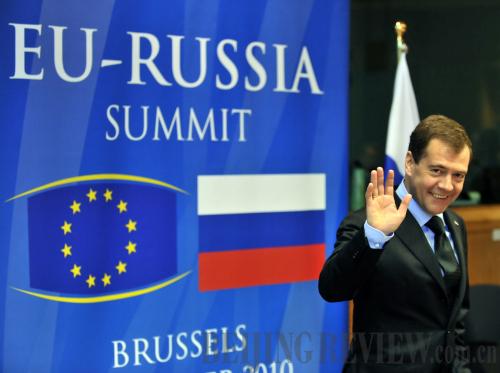|
 |
|
ELIMINATING BARRIERS: Russian President Dmitry Medvedev attends the EU-Russia Summit at the EU headquarters in Brussels on December 7, 2010 (XINHUA) |

After 16 years of marathon negotiations, Russia hopes to complete the final procedures and officially become a WTO member at the end of 2011 or the beginning of 2012.
Russia ranked 14th in the world in foreign trade in 2010, and is the biggest economy that has not yet joined the WTO. Joining the organization will definitely have a major impact on its domestic economy as well as its trade partners.
Russia applied to join the General Agreement on Tariffs and Trade, the predecessor of the WTO, as early as 1993. It set up a working group to process the application in the same year. In 1995, when the WTO was established, the working group changed its mission and began WTO negotiations.
By 2008, after 13 years of work, Russia had basically completed the negotiations. But the process was interrupted in 2009, when Russia created a customs union with Kazakhstan and Belarus. The three decided to join the WTO as members of the customs union. But later, due to the relevant regulations of the WTO, they changed this plan and decided to join the WTO as individual nations. Because the customs union regulations conflict with Russia's WTO commitments, Russia had to revise some of its WTO application documents, delaying the process further.
Russia's WTO application faced obstacles both at home and abroad. The external obstacles mainly came from the EU and the United States. Economically, the major points of contention between Russia and the EU included the opening up of Russia's airspace rights, import tariffs on civil aviation technology and spare parts, and government policies supporting the aviation industry.
Another focus was energy, especially natural gas. The EU asked Russia to eliminate the price difference of natural gas on domestic and international markets. It required Russia to cancel the export tariff it places on natural gas, open up the cross-border gas transportation market, and eliminate the monopoly of Russian gas extractor Gazprom. The two sides also held fierce negotiations on the transition period for Russia's entry into the WTO.
The United States was the last country to hold bilateral talks with Russia on WTO accession. The two sides argued over the opening of the Russian financial market, including banking and insurance. The United States asked Russia to cancel the import tariff on aviation technology and government subsidies for agro-industrial complexes. Intellectual property protection and quarantine of imported goods were also heated topics.
The main political obstacles for Russia came from the United States and Georgia. The Jackson-Vanik Amendment of the United States denies most favored nation status to countries with non-market economies that restrict emigration, and was occasionally applied to trade relations with Russia. But in June 2011, the Obama administration said it was making efforts to facilitate Russia's WTO entry and may even repeal the Jackson-Vanik Amendment.
| 